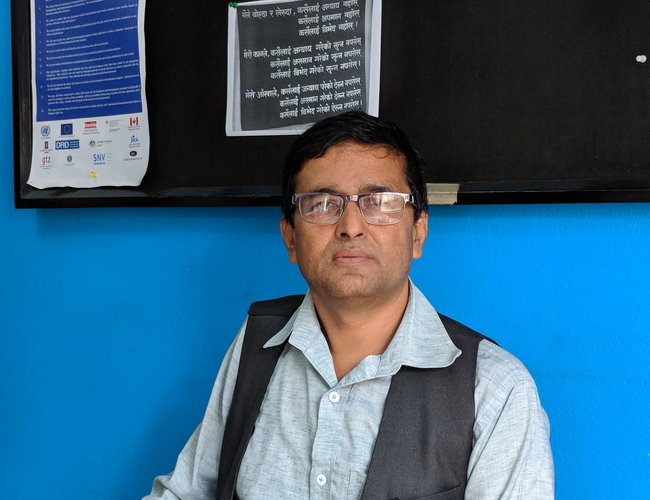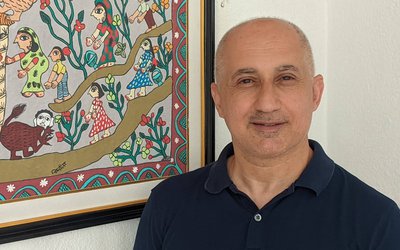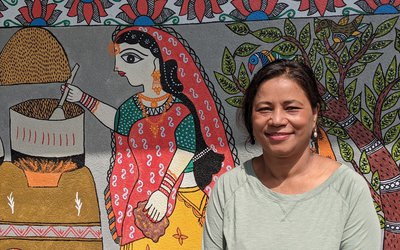
How do you distinguish the recently released television serial Singha Durbar II from Singha Durbar I?
Although Singha Durbar II was produced on the basis of Singha Durbar I, Singha Durbar II focuses more on the implementation of federalism, promotion of good governance and how all three tiers of government, central, federal and local levels, need to work in collaboration with the people. There is a message to policymakers, political leaders and others on what needs to be done to address the people and their concerns, mainly relating to their livelihood, effectively. Our objective is to create win-win situations for all, including political leaders, people and country. This is what we want to present through a drama or television serial.
What do you expect from the serials?
We have three expectations from the drama series. They are the need to change the common perception about politics and encourage younger generations to participate in governance and improve it. The common people tend to take politics as a dirty game and this does not look to be an area for educated youth to join in. Our message is that there is need of active participation of educated youth in politics to change the face of the country. For the development of the country and policy level change, politics can help.
What other aim does it have?
As Constitution of Nepal 2015 has made Nepal a federal state, pursuing a collaborative approach, we are giving the message on how the collaborative approach can be possible.
As the role of political parties is to bring social and economic transformation, there is the need of a collaborative leadership and need for the promotion of a collaborative culture. Only after this, there will be reform in governance, making the government transparent, accountable and responsible. Through the serial, we have made efforts to show the critical issues and challenges pointed out by the constitution in implementing federalism. These critical issues cannot be addressed just by raising the slogans against each other by ruling and opposition parties. Only through their internal collaboration and discussion, Nepal can solve the critical issues through successful implementation of federalism. The messages of the serials are clear. If all the political forces work together in a collaborative manner, people, country and political parties will all win.
Do you think your message will be received well?
As per the new constitution, there are 31 types of fundamental rights and there is the need to pass fundamental rights related bills before September 19. As long as there is a lack of collaboration and consensus between the political parties and support of civil society, the mission to promulgate the new acts is impossible. Our objective is also to show how such things can be sorted out through dialogue and collaboration. The serial also shows how to forward agenda like the rights of LGBT, ethnic minorities, civil society, health education and migration even with the support of international communities.
Are the serials also linked with SDGs? How do you relate this with broader audiences?
Sustainable Development Goals (SDGs) are not only Nepal’s commitment but also the commitment of 195 countries around the world. Nepal’s commitment means the commitment of 761 governments of three tiers. This is the commitment of 753 local level governments, 7provincial governments and 1 central government. SDGs are not a new agenda, but the agenda of Nepal will to fulfill them by setting targets. Hence, the serial will include the agenda in all 13 episodes of Singha Durbar II. The episodes will show the way to achieve them. Our 31 fundamental rights are also the agenda of SDGs. Agenda 16 of SDGs is about the good governance. According to this, all the governments need to be inclusive, participatory and accountable to the people. This is related to all areas whether it is education, health or population, employment or migration. SDGs in totality are the goals of the country to achieve prosperity.
In those 13 episodes, which areas are you focusing mostly?
We have about 10 themes. Our themes include health, education or right to education, security in migration and employment. Similarly, disaster management, right of minorities and marginalized population, how to reduce food security and hunger, how to strengthen institutions of the state -- these are some of the themes all our episodes look at. Out of these, we also focus on role of civil society and how important the role it has in fulfilling these agenda. A democratic government means collaboration between market, civil society and government. If we look at the trend of the last three years, the efforts are underway to sideline the civil society. By sidelining the civil society, Nepal cannot be a democratic and prosperous country. As long as the government fails to include the voices of marginalized and backward community in policies and planning and implementation, the desired collaboration is impossible, without involvement of civil society. The serials also include how to make the role of civil society effective in the efforts.
Where do you work?
We are leveraging on our expertise in building multimedia projects, facilitating dialogue, and collaborating with local partners to address these challenges and promote nonviolent conflict transformation. Our programs in Nepal focus on five areas: democratic participation, reconciliation, access to justice and security, development and economic growth, and collaborative, inclusive leadership
What are your impressions of Singha Durbar II following the completion of 3 episodes?
Our impressions are that the serial has generated a debate in society, political parties and government levels. After our last episode, Medical College bill has created a huge pressure. Even Dr. Govinda K.C staged a hunger strike. As our episodes show, there is a solution of every problem through dialogue. If we start dialogue and discussion, placing the country and people in focus, there are possibilities to find the solution to all the problems. Our program focuses on dialogues and collaborations between different stakeholders necessary to build a consensus. We have just aired three episodes but our YouTube viewers have already reached over 150,000, with over 20,000 reaches on Facebook. In this way what we can say is that the interest of the people is growing in a short period. We are also receiving feedback from high government officials, political leaders and other policy makers. They have commended our episodes saying that the serials show the solution to the crisis.
Since you are a governance expert yourself and governance is one of the weakest aspects of Nepal, how do you see this kind of program will help improve governance?
Good governance is a big issue, a great issue, but in other words, it is also a simple issue. Good governance is an indicator to see how people are receiving the services and what access they have in the service delivery system -- whether our governments and employees are people friendly or not and whether there is any discrimination or not. It is also a tool to see whether the government is accountable or not or does believe in consultations or not. This is also a tool to see whether the government quickly responds to public grievances. Search for Common Ground has been working in 35 countries around the world, in post conflict countries, to promote conflict resolution and good governance prospects. Until we bring all the stakeholders together to discuss the common problems and work in collaboration and collectively, it is not possible to achieve peace and for the country to drive in economic prosperity. Through the dialogue and discussion, we can create a win-win situation. We encourage the process where everyone can be a winner. This is what our serial Singhdubar I and II aim for.
- TANAHU HYDROPOWER PROEJCT: A Significant Achievement
- Apr 15, 2024
- AMBASSADOR HANAN GODAR: Sharing Pain With A Nepali Family
- Mar 30, 2024
- VISIT OF KfW AND EIB TO NEPAL : Mission Matters
- Mar 25, 2024
- NEPAL BRITAIN SOCIETY: Pratima Pande's Leadership
- Mar 24, 2024
- NEPAL ARMY DAY: Time To Recall Glory
- Mar 15, 2024
















